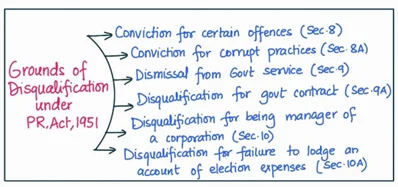Answer:
| Approach:
Introduction
- Introduce the Representation of People’s Act, 1951 (RPA) and its purpose in governing the conduct of elections in India.
Body
- Discuss the grounds for disqualification under the RPA (Sections 8, 8A, 9, 9A, 10, and 10A).
- Explain the remedies available to a person against disqualification, including appealing to a higher court, seeking judicial review, expunging the conviction, and obtaining a presidential pardon.
Conclusion
- Conclude, emphasizing the importance of the RPA in maintaining the integrity of the electoral process in India.
|
Introduction:
The Representation of People’s Act, 1951 (RPA) is an important piece of legislation that governs the conduct of elections in India. It provides the grounds for disqualifying a person from contesting elections or holding the position of a people’s representative.
Body:
Listed below are the key grounds for disqualification:

- Conviction for certain offenses (Section 8): A person is disqualified if convicted of any offense and sentenced to imprisonment for:
- Two years or more for any offense specified in the RPA.
- Six months or more for certain offenses related to promoting enmity between different groups, bribery, offenses related to elections, etc.
- Conviction for corrupt practices (Section 8A): A person can be disqualified for six years from the date of conviction if found guilty of corrupt practices by an order of the court.
- Dismissal from government service (Section 9): A person is disqualified if dismissed from government service for corruption or disloyalty to the state.
- Disqualification for government contracts (Section 9A): A person is disqualified if they have any subsisting contracts with the government for goods, services, or execution of public works and have not taken necessary steps to sever the contracts.
- Disqualification for being a managing agent or manager of a corporation (Section 10): A person is disqualified if they hold the position of managing agent, manager, or secretary of any company or corporation in which the government has a stake.
- Disqualification for failure to lodge an account of election expenses (Section 10A): A person is disqualified for three years if they fail to submit the account of their election expenses within the prescribed time.
Remedies available to a person against disqualification:
- Appeal to a higher court: A disqualified person can appeal to a higher court against the conviction or order that led to their disqualification. If the higher court acquits the person or reverses the order, the disqualification will be removed.
- Judicial review: A person can seek judicial review of the disqualification order by filing a writ petition in the High Court or Supreme Court, claiming the order to be unconstitutional or erroneous.
- Expunging the conviction: In rare cases, a person can seek the expunging of their conviction through a legal process, thereby removing the grounds for disqualification. However, this remedy is available only in exceptional circumstances and is subject to the discretion of the courts.
- Presidential pardon: In very rare cases, a person may seek a presidential pardon, which has the potential to reverse the conviction and remove the disqualification. However, this remedy is granted only in exceptional circumstances and is solely at the discretion of the President of India.
Conclusion:
This Act plays a crucial role in maintaining the integrity of the electoral process in India by outlining the grounds for disqualification and the available remedies. By ensuring that individuals who engage in corruption or other offenses are held accountable and disqualified from contesting elections or holding public office, the RPA contributes to the preservation of democracy in India.
